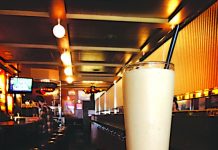
Phil Jones relishes the fact that every day, on his way to work, he drives by the place that grows the salad greens that will be on the lunch menu at Colors – Detroit. The restaurant and training center in the basement of downtown’s historic Beaux-Arts building uses as many local ingredients as possible as part of its mission.
Colors, which opened in January, is a project of the Restaurant Opportunities Center of Michigan, and Jones is the chef and general manager — an ideal assignment for the longtime community activist.
He likes to reel off the names and products of local businesses that supply his raw materials, many within Detroit city limits, like the greens grower Brother Nature Produce in Corktown. He mentions Avalon International Breads, Traffic Jam cheeses, sausages from Corridor Sausage Co. — even honey. Other Michigan producers include Melo Farms in Yale and Hampshire Farms in Kingston. “Plus, there’s a group of 12 urban farmers that will be supplying us,” Jones says.
As admirable as the local focus is, there’s much more to Colors. Its mission is to teach its employees how to be better at what they do and to learn, in addition to skills, how important empathy is in interaction with the public. Working at Colors, they’re expected not only to become better workers, but also more empathetic human beings.
Concrete planning for Colors – Detroit began last June — an effort supported by many organizations and community groups, including Greening of Detroit, Michigan Green Safe Products, Earthworks, the W.K. Kellogg Foundation, and the Arts League of Michigan, along with such supportive business as Slows Bar BQ. A spinoff of the first such effort — New York’s Colors, which was opened in 2006 by Windows on the World workers who were displaced by the 9/11 tragedy — its space had been empty for a couple of years, and required significant refurbishing. Many people remember the place, now the Virgil H. Carr Cultural Arts Center, as the Harmonie Club, and the sturdy structure retains much of its vintage charm.
What Jones calls “the first wave of employees” (cooks, waiters, and support staff) came on board in September. All 10 were chosen for their positive attitude. Some came via Michigan Works! Association, others responded to email blasts and Craigslist postings, and some, Jones says, just walked in off the street when they saw the activity in the basement space.
“We hire for attitude and train for skill,” says Jones, who says he was seeking a variety of “experience and experiences” brought by each prospective employee.
Jones believes in proceeding slowly and carefully. Colors is open only for lunch at this point, with longer hours to be added later. Colors does host some private events in the evening and offers catering services; dinner won’t be added on a regular basis until the liquor license, now pending, is in place.
The menu is relatively small but interesting, with international touches, such as Salvadoran empanadas, Greek meatballs, shrimp toast, and fried wontons filled with sweet potatoes — all on the appetizer list. A list of sandwiches and sides and a couple of changing entrees fill out the offerings and are typified by achiote-rubbed roasted free-range chicken, all well prepared under Jones’ direction.
At this point, there are just the New York and Detroit Colors, but the idea is expected to take root in nine more cities across the country.
If you enjoy the monthly content in Hour Detroit, “Like” us on Facebook and/or follow us on Twitter for more frequent updates.
|
|
|











